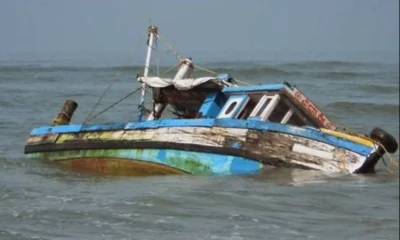Benue news
Benue flood: Before government comes (Opinion)

By Nathaniel Ikyur
For about a year or so, that’s between 2016 and 2018, I worked as an aide to Governor Samuel Ortom on Public Utilities, Environment and Sanitation in his first tenure. Part of my brief was to ensure that Benue residents, particularly in Makurdi the state capital in the first instance, was free from environmental hazards. Which meant that the environment must be clean.
With the backing of the governor, my team and I worked tirelessly to get the residents on the same page with our mandate. And we attained some level of successs owing to the zeal my team and i took our assignment. Within this time, we were able to reduce the issue of flooding within Makurdi.
But one ugly side we discovered was that we are partly our problems. Our team discovered in the course of carrying out our task that residents were in the habit of dumping wastes into drainages that would ordinarily have flowed freely. And we made some arrests of highly placed individuals, their spouses or even their drivers who would convey wastes generated from their homes to dump into canals and drainages when it rains in their SUV cars. Most of these arrests could not be persecuted by the sanitation court owing to interventions from high quarters.
Secondly, residents will prefer to wait on government to clear the drainages in front of their residences even where they ought to take up these responsibilities as prescribed in the Benue State Environmental Sanitation Authority, BENSESA Act of 2005. This abdication of responsibility by individuals culminated in the near-death situation where floods rendered a large chunk of Makurdi residents and some parts of the state homeless in subsequent years.
And last night, Thursday August 7th, 2019 on the 10pm news bulletin of Channels Television, Mr Clement Eze, the Director, Engineering Hydrology of Nigeria Hydrological Services Agency addressed a press conference in Abuja. He warned of more flooding in some states in the North and some southern coastal cities.
Eze warned states and communities by the banks of Rivers Niger and Benue and their floodplains, that there had been systematic daily rise in the water levels on both rivers. The agency, in the flood alert, said that records from its measuring stations in Lokoja (River Niger) and Makurdi (River Benue) clearly showed that the water level was rising.
This situation, he noted, “called for watchfulness on the part of the riparian states as there was still the likelihood of occurrence of river flooding” stressing that already, “Shiroro Dam had joined Kainji and Jebba dams in spilling water” noting that this had contributed to the steady rise in the water level particularly among “states that were contiguous to Rivers Niger and Benue should be on alert in the event of river flooding.”
These states are Kebbi, Niger, Kwara, Kogi, Edo, Anambra, Rivers, Delta, Bayelsa, Adamawa, Taraba and Benue.
According to the NHSA director, “as at today, our hydrological measuring station downstream the confluence in Lokoja recorded a stage height of 9.89m and a discharge value of 21,326 cubic metres/second as against lower values of 9.43m and 19,762 cubic metres/second recorded on the corresponding date of 06-09-2012.”
From the foregoing, he noted, “it could be said that all the indices that caused the 2012 river flooding have manifested, except spillage of water from the Lagdo Dam. For the records, it was on 29-09-2012 that the maximum flood level of 12.840m and the corresponding discharge of 31,692 cubic metres/second were recorded at our station in Lokoja, downstream the confluence in 2012.”
By the 2018 Seasonal Rainfall Prediction released earlier in the year by the agency, according to him, September 28 is the earliest cessation date of rainfall in Sokoto and Katsina, while December is the earliest cessation date for the southern coastal cities.
He said, “High flows are still being expected from the upper catchment of the Niger Basin. The River Benue is equally rising, though the level of water as at today has not attained the level witnessed at this time in 2012.”
The implication of this is that the northern part of the country should be expecting more rains in the next three weeks which is what we may have began to see with the rains in Makurdi last night.
Eze disclosed that flood in some cities and communities in the country were expected to continue due to high rainfall intensity of shorter duration, rainstorms, blockage of drainage system and poor urban planning, as well as coastal flooding resulting from sea rise and storm surges.
Consequently, the NHSA has advised states and local governments to take immediate action by doing the following:
a: Ensure that all residents living on the river banks are evacuated,
b: Remove structures built within the floodplains,
b: Clear blocked drainages, culverts and other waterways
c: Don’t block drainages by dumping refuse/waste into them,
d: Desilt/remove wastes already in drainages in and around your residential, commercial buildings,
e: Ensure your drainages are flowing freely.
Apart the aforementioned, government agencies must act proactively by enforcing the sanitation laws as prescribed in the BENSESA Act of 2005. There are enough penalties there in the sanitation law so that wherever breaches are noticed, the people are made to conform with the laid down precedures, by ensuring they pay all fines/fees or face the Sanitation Mobile Court to serve as a deterrent. This is first for their safety and also to avoid these disasters.
Let’s therefore heed to the warning from Nigeria Hydrological Services Agency now by acting fast on the above saftey tips and save ourselves the trauma of being rendered homeless by the floods before government acts.
Ikyur is a journalist and was an Aide to the Benue State Governor on Public Utilities, Environment and Sanitation and writes with Agency Reports from Abuja.






















